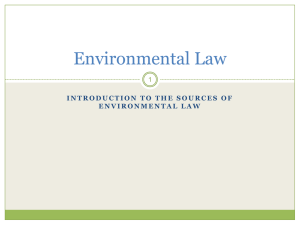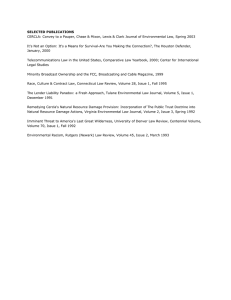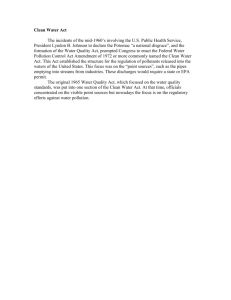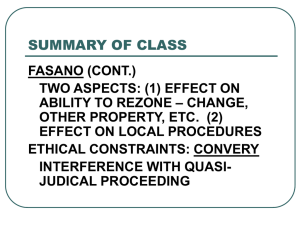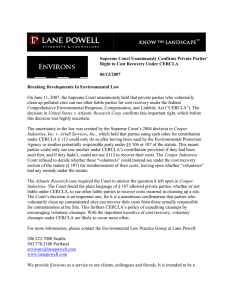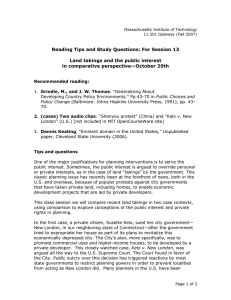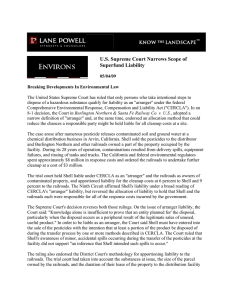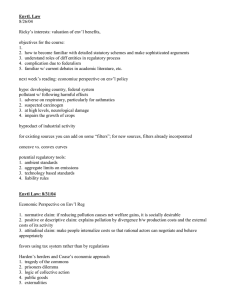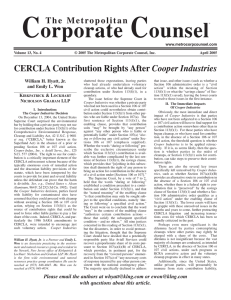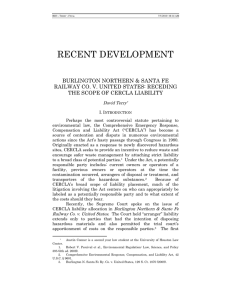Environmental Law Syllabus Prof. Charles Irvine Fall 2016
advertisement
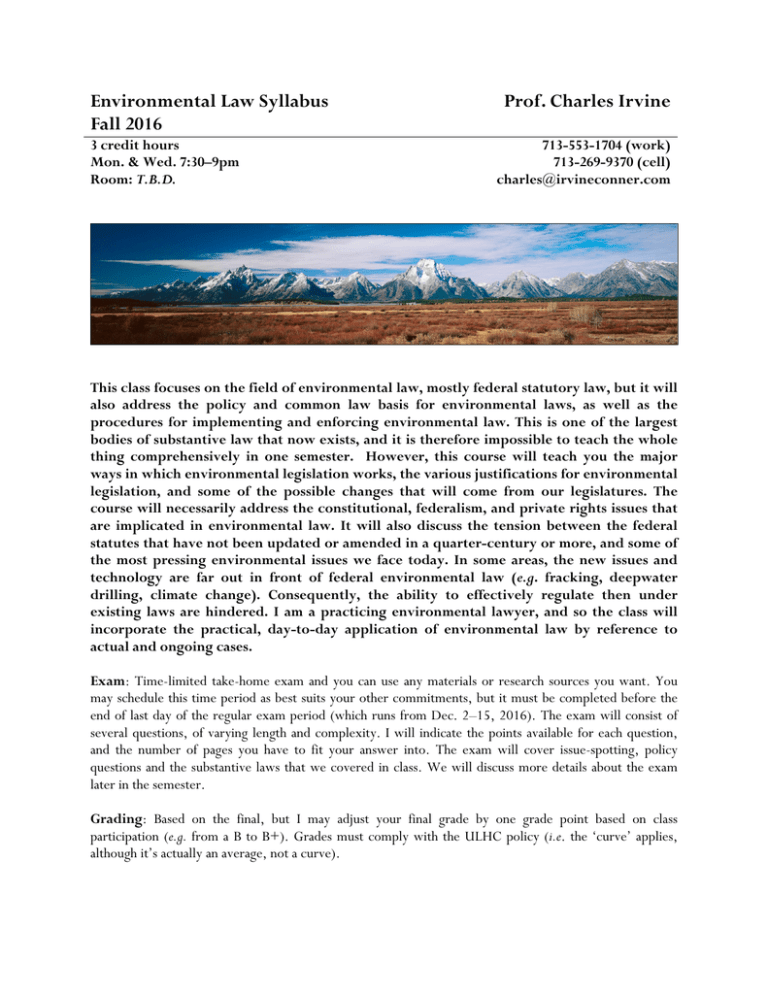
Environmental Law Syllabus Fall 2016 3 credit hours Mon. & Wed. 7:30–9pm Room: T.B.D. Prof. Charles Irvine 713-553-1704 (work) 713-269-9370 (cell) charles@irvineconner.com This class focuses on the field of environmental law, mostly federal statutory law, but it will also address the policy and common law basis for environmental laws, as well as the procedures for implementing and enforcing environmental law. This is one of the largest bodies of substantive law that now exists, and it is therefore impossible to teach the whole thing comprehensively in one semester. However, this course will teach you the major ways in which environmental legislation works, the various justifications for environmental legislation, and some of the possible changes that will come from our legislatures. The course will necessarily address the constitutional, federalism, and private rights issues that are implicated in environmental law. It will also discuss the tension between the federal statutes that have not been updated or amended in a quarter-century or more, and some of the most pressing environmental issues we face today. In some areas, the new issues and technology are far out in front of federal environmental law (e.g. fracking, deepwater drilling, climate change). Consequently, the ability to effectively regulate then under existing laws are hindered. I am a practicing environmental lawyer, and so the class will incorporate the practical, day-to-day application of environmental law by reference to actual and ongoing cases. Exam: Time-limited take-home exam and you can use any materials or research sources you want. You may schedule this time period as best suits your other commitments, but it must be completed before the end of last day of the regular exam period (which runs from Dec. 2–15, 2016). The exam will consist of several questions, of varying length and complexity. I will indicate the points available for each question, and the number of pages you have to fit your answer into. The exam will cover issue-spotting, policy questions and the substantive laws that we covered in class. We will discuss more details about the exam later in the semester. Grading: Based on the final, but I may adjust your final grade by one grade point based on class participation (e.g. from a B to B+). Grades must comply with the ULHC policy (i.e. the ‘curve’ applies, although it’s actually an average, not a curve). Casebook: T.B.D Classes: First class: Aug. 22, 2016. Last class: Nov. 28, 2014. I will attempt to keep my work schedule free, but situations may arise that require cancellation (either due to work, weather, etc.). Whenever possible, I will arrange for a guest speaker if I cannot attend. I will let you know about any cancelled classes as early as possible. If a class is cancelled, I will discuss with you how we will make up the lost time. I will keep track of actual teaching time whenever class runs a few minutes over, and it’s likely we’ll gain enough time to avoid having to schedule additional make-up classes. You must attend 80% of the classes, and I am obligated to keep track of attendance. I will contact you if your attendance becomes a concern to me. Laptops may be used during class but for note-taking and class purposes only. Class Preparation: I expect you to have completed the reading assigned for each class, and to be prepared to make meaningful contributions to the discussions. To facilitate class discussions, I may ask open questions to the class, and call on you individually. Failure to be prepared in more than two classes may count against your final grade. I may use powerpoints during class, and when I do, I will make them available to you. However, powerpoints will be used as an aide to the materials taught, and will not contain all the information covered in class. Office Hours: I will make myself available after each class should you have any questions. I will also be available by appointment, contact me by email or phone. If you have any concerns about the class, the materials we cover or anything else, please let me know so I can address your concerns. General Syllabus: 1. Polices, Problems, and Values a. Economics and Ecology b. Common Law Roots c. Statutory Law d. Regulation and its Alternatives, Regulatory Options e. The Regulatory Process 2. Environmental Assessment a. Introduction to NEPA and the EIS Requirement b. Cumulative Impacts, the Significance Requirement and Environmental Assessment c. Adequacy of EISs, How Well Has NEPA Worked 3. Biodiversity Protection a. Rationale for Preserving Biodiversity, Introduction to the Endangered Species Act b. Listing Process, Review of Federal Actions c. Protecting Endangered Species Against Private Actions, Public Resource Management 4. Air Pollution Control a. Introduction to CAA, Ambient Air Quality Standards b. State Implementation Plans c. Offsets, Bubbles, Emissions Trading and Interstate Pollution d. Mobile Sources & Technology-Forcing 5. Water Pollution Control a. Statutory Authorities for Protecting Water Quality b. Effluent Limitations on Point Source Discharges c. Water Quality-Based Controls d. Wetlands Protection and the Section 404 Program 6. Waste Management and Pollution Prevention a. Statutory Authorities Affecting Waste Management b. Identifying Hazardous Waste, Household Waste Exclusion, Subtitle D c. Introduction to CERCLA, CERCLA Liability, Responsible Parties d. CERCLA Liability: Operators and Arrangers e. Strict, Joint and Several Liability and Allocation of Liability f. Disposal Alternatives and Commerce Clause Limitations 7. Environmental Enforcement a. Detecting Violations, Enforcement Authorities and Policies b. Criminal Enforcement c. Standing and Citizen Access to the Courts d. Citizen Suits 8. Regulation of Toxic Substances a. Introduction to Toxics Regulation & Risk-Benefit Balancing b. Risk Assessment, Feasibility-Limited Regulation & Health-Based Regulation 9. Land Use Regulation and Regulatory Takings a. Land Use and the Environment, state and Local Regulation of Land Use, Introduction to Regulatory Takings Law b. The Modern Revival of Regulatory Takings Jurisprudence 10. Protection of the Global Environment a. Introduction to International Environmental Law, Protection of the Global Atmosphere b. Global Climate Change: Legal and Policy Responses c. International Trade and the Environment
